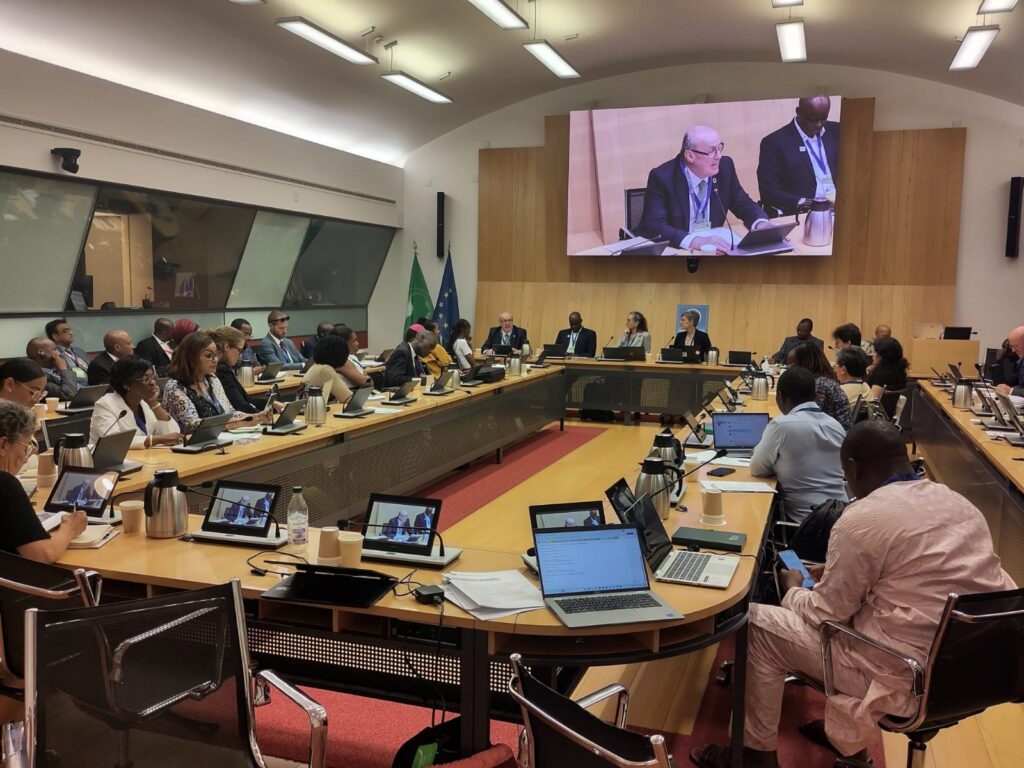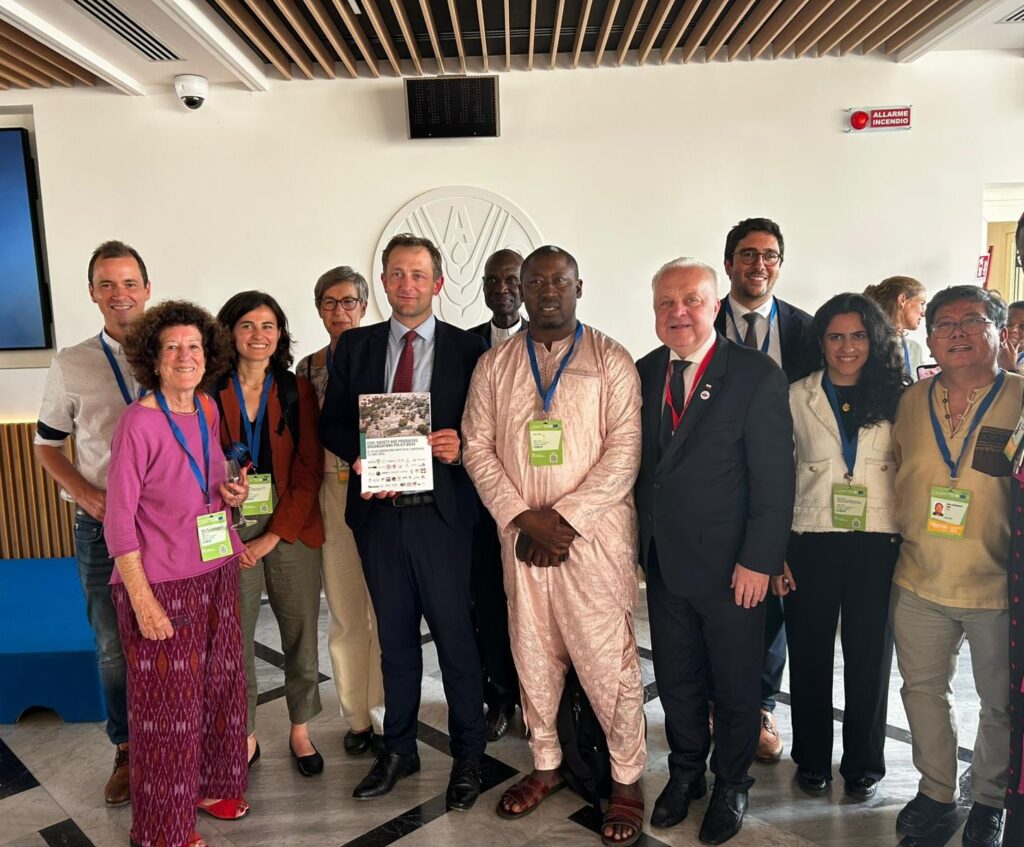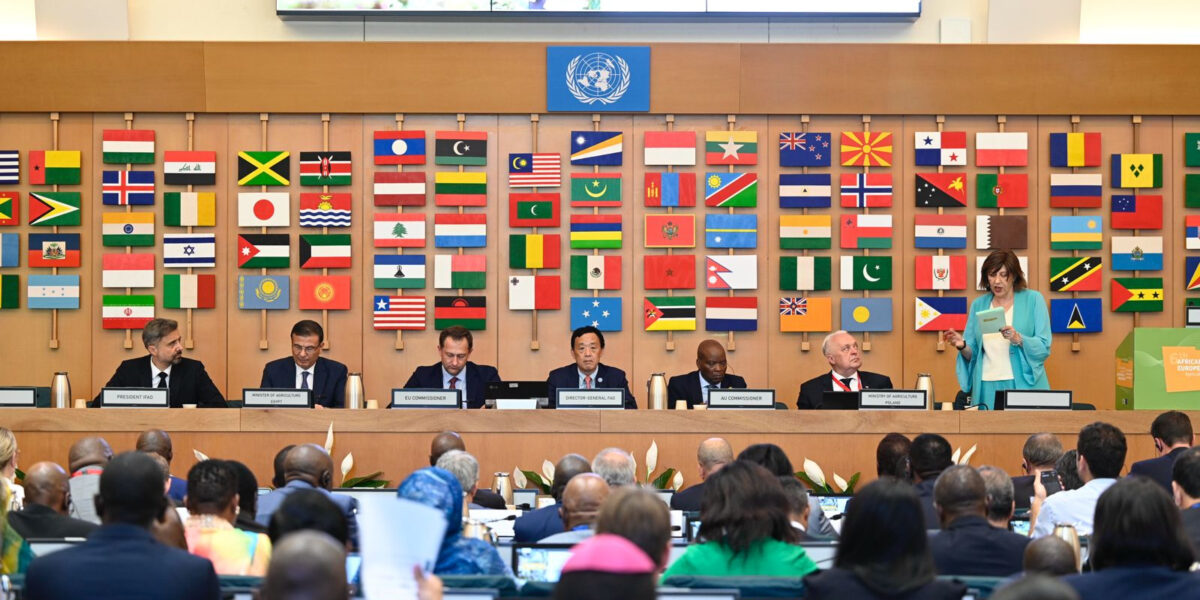The African Union-European Union (hence, AU-EU) biennial ministerial meetings on agriculture are important landmarks driving cooperation and investment programs in agriculture and food systems between the two continents.
They are part of the Africa-EU Partnership, established in 2000 to frame bi-regional cooperation under the helm of EU and AU Member States, with participation by civil society and youth organisations, economic and social actors, and the private sector. The Partnership is guided by the Joint Africa-EU Strategy, renewed at the 6th EU-AU Summit (Feb. 2022) with the adoption of a Joint Vision for 2030. This Vision focuses on a shared investment agenda, including an Africa-Europe approach and private-public partnerships for implementation, translating the EU Global Gateway in the African continent. While recognising the importance of food security and nutrition, it does not single them out as priority investments.
The 6th AU-EU Agriculture Ministerial Conference was a long-awaited opportunity for African and European CSOs to contribute to high-level decisions and shape African Food Systems and the livelihoods of small-scale food producers and rural people towards greater equity, justice, and sustainability through an organised platform created to enhance coordination and amplify advocacy about the Africa-EU Partnership.

The independent Africa-EU Civil Society Platform (CSEP) was indeed launched in October 2024 by CSOs of both continents, to serve as a structured space to engage with Africa-EU decision-makers; it includes a dedicated Working Group on Food Systems and Agriculture. This innovative platform opens the door for continued, structured bi-regional CSOs engagement by enhancing common understanding and coordination, channelling shared advocacy messages to institutional actors and relevant stakeholders. Alliance2015 participated in the creation of this platform and is an active member of its WG on Food Systems and Agriculture, along with Helvetas in Ethiopia.
The changed geopolitical context made this conference all the more crucial for the future of Food Systems in Africa. The alarming effects of the climate crisis, worsening inequalities, food insecurity, and hunger in the continent demand achieving justice, sustainability, and community-led development pathways, away from the alleged “solutions” provided by the current large-scale, industrial, and export-led agricultural system.
Among the main risks, the recourse to corporate technology (e.g. hybrid or GMO seeds, chemical fertilizers and pesticides) proposed as “innovation” – which in reality perpetuate dependency, marginalising traditional knowledge and small-scale food producers – as well as the shortcomings of the EU Global Gateway – with its high potential to turn African food systems into a market for European exports and private sector – demanded serious discussion.
In addition, the launch of a new CAADP Strategy and Action Plan 2026–2035 for Africa and a new Vision for Food and Agriculture in the EU, called for renewed advocacy ahead of the 6th AU-EU Agricultural Ministerial on each of its four thematic priorities:
- investment in agri-food value chains;
- sustainable practices and climate resilience;
- research, innovation, and technology;
- market access and trade facilitation.
Over the months ahead of the conference, European and African civil society and producers organisations worked together to prepare messages both to EU decision-makers and to all Ministers attending the conference, as well as a Side Event looking at avenues for the AU-EU Partnership to strengthen local Food Systems, build climate resilience, advance nutrition and gender equality, which integrated the official programme. To complement these initiatives, participating organisations met in Rome on the eve of the conference to strategise diversified advocacy actions and maximise impact through the various sessions of the day.
The Side Event brought together the visions of food producers and the organisations working with them, as well as those of policy makers, to emphasise the importance of effective partnerships whereby local communities and small-scale food producers are duly recognised as co-leaders in the required Food Systems transition:
- Nosipho Jezile (Chair of UN Committee on World’s Food Security): Africa’s food insecurity stems more from poverty and systemic exclusion than food shortage. She called for combining technology with traditional knowledge and better-targeted use of limited resources.
- Hakim Baliraine (AFSA): Criticised government and EU policies that favour large agribusiness over small farmers. He advocated for agroecology as a modern, just, and sustainable approach.
- Francis Agbere (Oxfam): Argued that international aid often benefits corporations rather than local farmers. He urged financing that supports local farmers’ rights, equity, and climate justice.
- Peter Cleary (Irish Embassy): Reaffirmed Ireland’s support for agroecological and inclusive development aligned with CAADP strategies.
- Musa Sowe (ROPPA): Stressed that Africa must manage its own food systems to secure a sustainable future.

These discussions were enriched by contributions from many EU and AU delegates – in particular, interventions from the Belgian Ambassador, the former AU Commissioner for Agriculture and Rural Development and current Ambassador of Angola, the Embassy of Uganda – clarifying the revendications for justice, identity and autonomy rising from the protagonists of African Food Systems. A self-reliant future for African food producers and communities will only exist when financial resources, decision-making, and international cooperation are sought to achieve these values. Recognising small-scale food producers, women, and youth as ‘co-owners’ is paramount to realising food sovereignty, environmental sustainability, and community-led development.
The afternoon plenary session reconvened AU and EU Ministers of Agriculture to hear takeaways of the morning’s thematic discussions and set the direction of mutual cooperation. A series of political declarations with no real debate took place, and unlike the 5th Conference in 2023, civil society and producers’ organisations did not have space to intervene.
However, several Ministers from both the EU and AU took up our calls, expressing their governments’ support for the reinforcement of local food systems, agroecology, and community-led approaches to find their legitimate space along with larger investments under the Partnership. At the closing of the conference, we succeeded in handing out our policy recommendations to the EU Commissioner for Agriculture, creating the bases for future dialogue with CSOs, increased understanding and cooperation on elevating the Food Systems and Agriculture dimensions of the AU-EU Partnership, and beyond.
While it is too early to draw a comprehensive assessment of the outcomes of this Conference, we can certainly see as an accomplishment the coordinated engagement of African and European CSOs and producers’ organisations, which enabled them to speak with one voice. We can also rejoice in having received so much visibility and attention, thanks to our ongoing and content-relevant dialogue with EU organizers, Ambassadors, and officials from the EU, the AU, and the UN, which has built our credibility over time. We will continue our advocacy and monitor how the announced commitments will be operationalised, with special attention on their impacts in Africa and on generating opportunities for cooperation with local civil society actors and grassroot communities.
As the AU-EU Partnership proceeds to its next Summit on 24-25 November 2025, and as the Global Gateway Forum on 9-10 October will take stock of the EU global Partnerships, it is important to renew our joint call for transforming Food Systems towards food sovereignty, realising the right to adequate food for all, and sustainability.
Our joint recommendations will be open for endorsement by civil society actors and producer organisations who wish to express their support until September 2025. Alliance2015 members are invited to co-sign (simply scroll the document and click on the link to the online form at the end), as well as to join the Africa-EU Civil Society Platform to shape together the future of African Food Systems.


